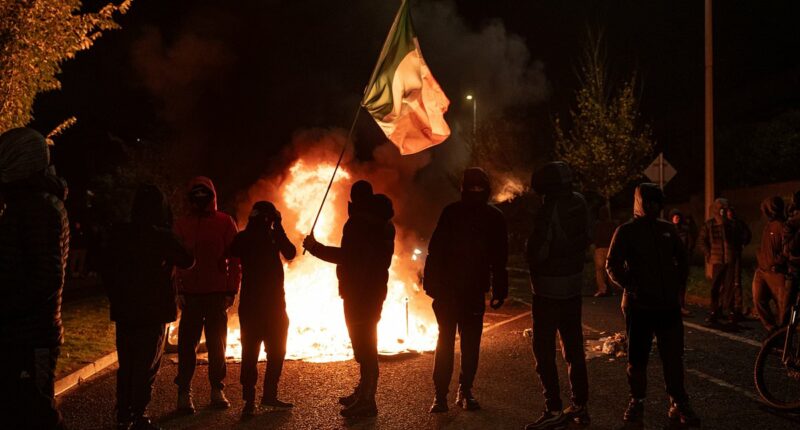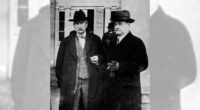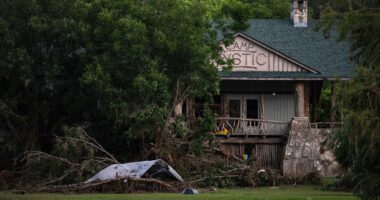Share this @internewscast.com
As daylight begins to fade, Nina and Valentina are hurrying back to their accommodation after another long day of cleaning.
“We need to move quickly!” Valentina insists, glancing anxiously at her watch. “We shouldn’t be out after 7 PM,” Nina explains to me.
Both women speak with distinct Eastern European accents, a reminder of their Ukrainian heritage. Their urgent pace brings to mind scenes from classic Dracula films, where wary Transylvanian villagers rush to secure their homes before nightfall brings danger.
In this area, however, it’s not vampires that concern the residents but rather groups of masked troublemakers. Some even ride on horseback, wielding rocks, fireworks, and fire bombs.
We find ourselves in the affluent suburb of Saggart in Dublin, where an unsettling atmosphere takes hold as evening approaches. Instead of preparing for a bustling night, the Anvil restaurant and bar ceases service at 6 PM, locking up the parking lot and sending employees home early.
Claud, who manages the Roma takeaway pizza shop, also closes his doors at 7 PM rather than the usual 11 PM. “I’m forced to forgo my busiest hours,” he laments. Meanwhile, the Dublin transport authorities have suspended the local tram service, leaving countless commuters stranded far from their homes.
What worries them all is yet another outbreak of violence outside the former luxury golf resort which Nina and Valentina, together with 2,400 refugees and asylum seekers, call their temporary home.
The village might feel like the last place you’d expect pitched battles – with its gated executive estates and high-walled mansions, it feels like classic footballer/stockbroker country.

Marauding hordes of masked yobs – some on horseback (pictured) – descended on the prosperous Dublin suburb of Saggart armed with rocks, fireworks and even fire bombs

The suburb exploded into a scene of chaos as protestors set bins on fire (pictured) near the Citywest hotel complex on October 21, 2025 after reports that a ten-year-old Irish girl had been sexually assaulted

Robert Hardman (pictured) visited the hotel in Saggart to report from the front line of the riots
However, as Britain saw this summer in the prosperous Essex commuter town of Epping, some riots are nothing to do with poverty.
That sorry saga could almost be a blueprint for the pattern of events unfolding all this week outside the Citywest hotel complex ten miles from the centre of the Irish capital.
Indeed, this dispute feels like Epping on steroids. After all, it’s not often you get a cavalry charge against the police.
The story is, sadly, a familiar one. A local hotel is requisitioned by the government for housing migrants. Despite peaceful protests from the neighbours, large numbers of undocumented single males are sent to live there while their lengthy quest for asylum is processed.
Gangs of youths, with nothing to do all day, hang around local shops and parks. The locals, especially young women, suddenly think twice before leaving home alone to walk the dog or take a run or just go to work.
And then one of the migrants is arrested for doing something unspeakable.
At which point, the locals go berserk saying ‘I told you so’, the police respond with force, the government dithers, the Right demand deportations, the Left decry ‘racism’, blameless migrants feel terrified and the community is left more polarised than ever.
That is precisely what has been occurring here in Saggart since Monday’s first reports that a ten-year-old Irish girl had been sexually assaulted in the grounds of a local asylum centre.
A 26-year-old man was arrested, with no further statement from the authorities. The locals did not need Hercule Poirot to put the pieces together, given that the suspect was ‘not working’, that he required the services of an Arabic translator and that the police had cordoned off a crime scene in the grounds of an asylum complex.
Until relatively recently, this was Ireland’s largest hotel, a sprawling golfing-cum-conference resort and spa with 764 rooms spread across several hotel blocks. The local community would enjoy access to its pools, leisure centre and job opportunities.
For the last three years, it has been off-limits to the Irish and fully booked by the Irish government, with one block reserved for up to 1,200 Ukrainians and the rest housing an estimated 1,200 asylum-seekers, mainly from Africa and Asia.
Any hope that Citywest might revert to its former existence was dashed last month when the government paid £132million for ownership of the whole complex (to the delight of the property speculators who had bought the struggling site for just £26million ten years ago). It will now be Ireland’s largest permanent asylum centre.

A police vehicle (pictured) was burned as a demonstration outside the hotel turned violent on October 21

Masked rioters set fire to bins (pictured) near the hotel on October 21 as mayhem gripped the streets of Dublin
In other words, the anger was already bubbling under well before word of a sex attack started to spread late on Monday. So far, so Epping.
The following evening, however, it was not just residents who arrived to demonstrate but around a thousand protesters from far and wide.
Waving the Irish tricolour, many seemed to be part of a nativist WhatsApp group clearly hell-bent on mayhem.
Locals found themselves fighting masked incomers who were pulling down walls and fencing, raiding rubbish bins for bottles and launching fireworks at wholly ill-prepared Gardai (police).
In the middle of it all, a group of young men in balaclavas turned up on horseback and rode through the front lines while a Gardai van went up in flames.
That evening, the Irish prime minister, Micheal Martin, issued a statement to say he ‘strongly condemned’ the attacks on the Gardai. ‘There can be no justification for the vile abuse against them, or the attempted assaults and attacks on members of the force,’ he declared.
This did nothing to calm the situation, largely due to the fact that he had conspicuously failed to make any mention of the two central issues: the ten-year-old girl victim and the alleged perpetrator.
Social media, needless to say, filled in the gaps, claiming that the man in custody was not only Sudanese but was a failed asylum-seeker who had been issued with a deportation order months ago (neither of these claims has been confirmed or denied by the authorities). The girl, it emerged, had been in a state-run care home. It would, therefore, appear that the state has multiple questions to answer.
So back came the mob on Wednesday night, with more rocks and fireworks, though they left the horses at home this time.
Back, too, came the Gardai, armed with more kit including the Public Order Unit (armoured riot police), several horses of their own, a helicopter and the force’s two brand new water cannon vehicles, recently purchased for £1.3 million.
While water cannon have been used to quell past disturbances in Northern Ireland, they had never been used in the entire history of the Republic.
Further pitched battles ensued but, this time, the Gardai pushed protesters away from the hotel gates – without switching on their water jets – and drove the mob back down the road, while making a further 24 arrests (17 have now been charged).

Gardai officers arrived on October 21 with more kit including armoured riot police (pictured)
What makes this saga all the more interesting for a non-Irish audience is that it was unfolding against the backdrop of yesterday’s Irish presidential election.
That has been a choice between two women, one centrist and one far-Left (a third, male, centre-Right candidate withdrew after a row about unpaid rent).
With the complex nomination process safely in the hands of Ireland’s political class, there was never any chance of an Irish Nigel Farage making it on to the ballot. Hence widespread expectations – by the bookies – that yesterday would record the lowest turnout in history.
The result is expected later today, with Catherine Connolly favourite to win a seven-year term as Ireland’s head of state. Of Corbynista stock (she has accused the US of enabling ‘genocide’ and Nato of ‘warmongering’), she is backed by Sinn Fein. This week, she described those voicing concerns about immigration as ‘disturbing and unacceptable’.
The presidency is supposed to be a non-political force for Irish unity. With opinion polls showing growing divisions over the impact of record numbers of migrants on housing and public services, the presidential election seems likely to underline the sense of a deeply divided Ireland.
Expect more of the same next week, too, in the Netherlands, which holds a general election on Wednesday with the far-Right out in front.
Migration remains the open sore across European politics.
I arrive at Citywest on the eve of polling to find that the police are still taking no chances. Steel fencing has been erected along the open sections of the hotel’s sumptuous grounds (I have been here before in calmer times).
Lines of Gardai in hi-viz jackets block the front and back road entrances to all except residents who must show their passes. Tonight’s protest outside the front gate is peaceful, sullen and seems to be entirely local.
Residents’ groups have demanded that the yobs stay away and, while there are several dozen young men swaggering around in balaclavas, no one chucks anything. Someone is playing the old IRA anthem, ‘The Men Behind The Wire’ through a loudspeaker.
A woman with a megaphone marches up and down shouting: ‘What do we want? Justice! When do we want it? Now!’ but the response is lukewarm. I sense a deeper anger, biding its time.
‘People know there’ve been other young girls attacked, and not just young girls, and it’s going on wherever they have these open centres,’ says Patrick, 40, a builder from Dun Laoghaire.

Officers (pictured on October 22) also had horses of their own, a helicopter and the force’s two brand new water cannon vehicles, recently purchased for £1.3 million
‘If you complain about it you’re accused of extremist views and being racist. Well I don’t see myself that way. We want our streets back but, instead, we just get more of these centres opening behind our backs.’
The woman with the megaphone pauses for breath. She tells me that she is Sinead, a mother of three school-age children and that she was among those who organised a peaceful protest back in the summer after the announcement that the government was planning to buy the hotel.
‘No one asked us about it. No one tells us who is in there and we have every right to protect our kids,’ she says.
‘That used to be a local amenity. We used to have Christmas fairs there and use the pool but now it’s out of bounds.
‘It’s the same all over Ireland. And these incidents are being covered up all the time.’
Another man, in both balaclava and sunglasses, and who will not even give his first name, waves his banner in front of me. It’s a copy of the section of the Irish constitution defending children’s rights.
‘All children should be cherished equally. I live here and I’ve got two daughters, same age as that poor girl who was attacked,’ he says. Why such secrecy? He tells me he won’t be identified because, on the previous two evenings, the Gardai have been grabbing anyone they can and are looking to make more arrests.
Away from the protesters, who number around 200 this evening, I find considerable sympathy for the police.

Masked men wearing balaclavas (pictured) set objects alight near the hotel on October 21 as the riots erupted

Gardai (pictured on October 23) were initially ill-prepared for the attacks they would be on the end of – including having fireworks thrown at them
‘Those hooligans were not locals and they’ve been coming here for a fight,’ says neighbour and businessman, Graham, 40.
‘You can tell by the accents and the number plates that a lot are from the travelling community. The rumour is that they have links to the girl who got attacked.
‘The other night they turned up with tools and started raiding my neighbour’s house for rocks and concrete. One of them hit him and he hit them right back.
‘What the Gardai are doing is heroic but they won’t be standing there forever. My worry is that when their backs are turned, someone will get in there and torch the place.’
In the twilight, I meet childcare worker Sharon, 58, accompanied by her daughter, Jane 34. They are out walking the dog before what amounts to the local curfew.
‘The violence is disgusting but the government have to realise that people, especially women, don’t feel safe here any more,’ says Sharon.
They also point to the tensions inside the complex between single young African and Asian men and Ukrainian women with children.
She adds: ‘It’s only going to get worse.’ Then she looks at her watch and apologises.
‘Sorry, but I’ve got to get back before it’s dark.’

















